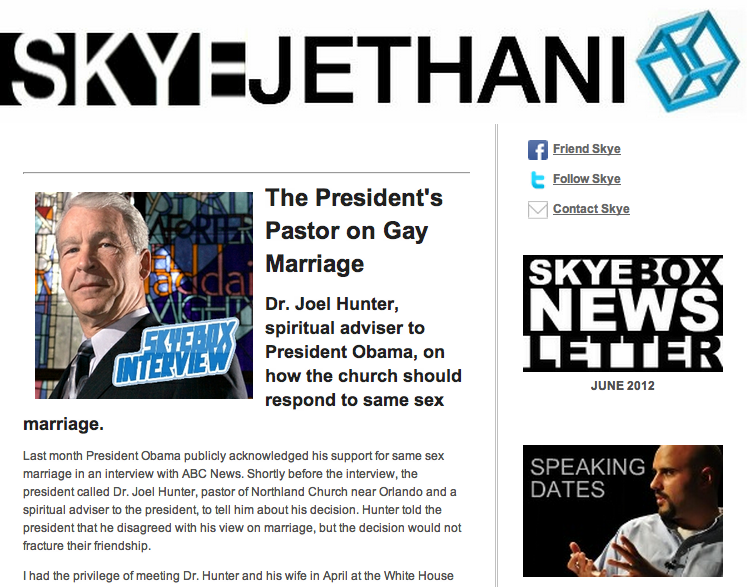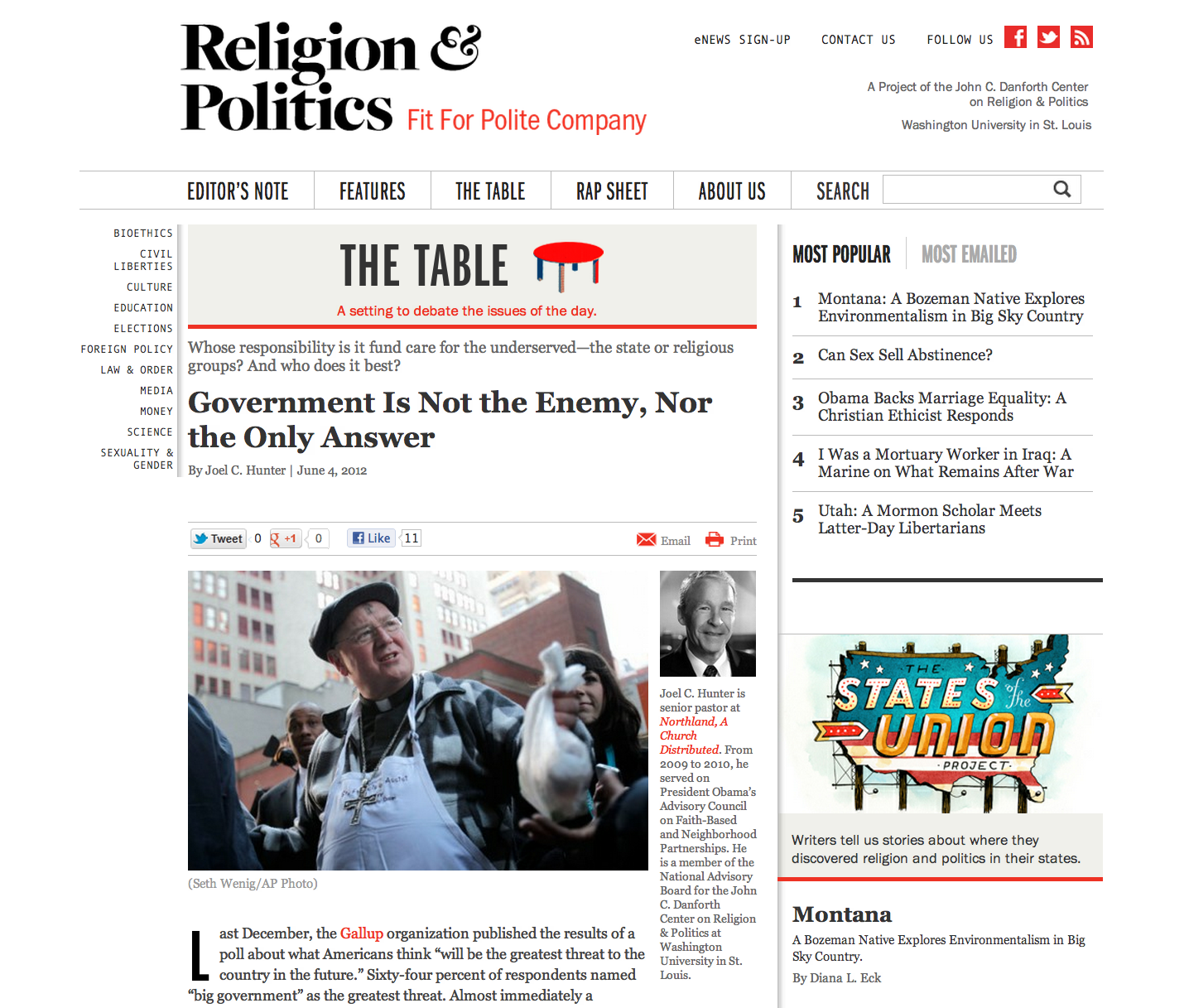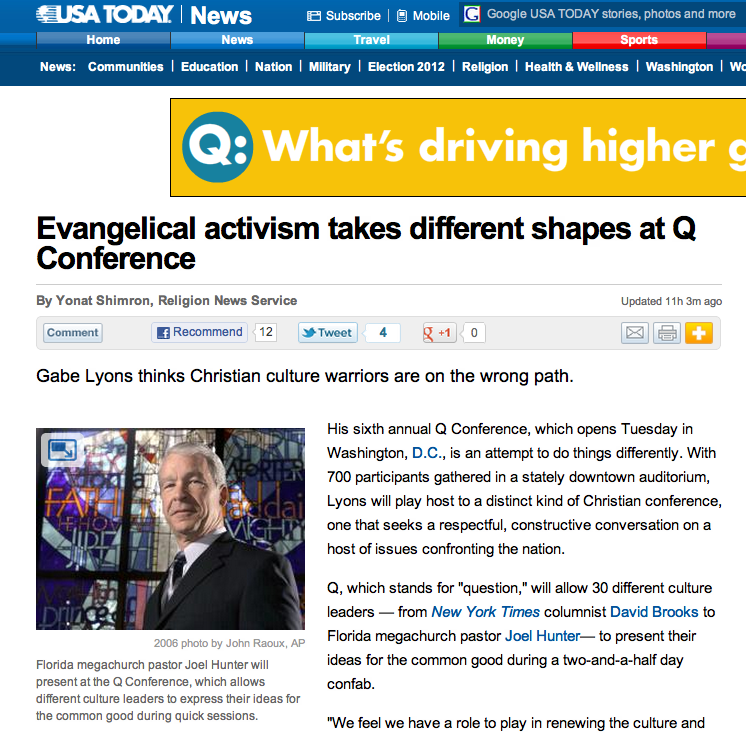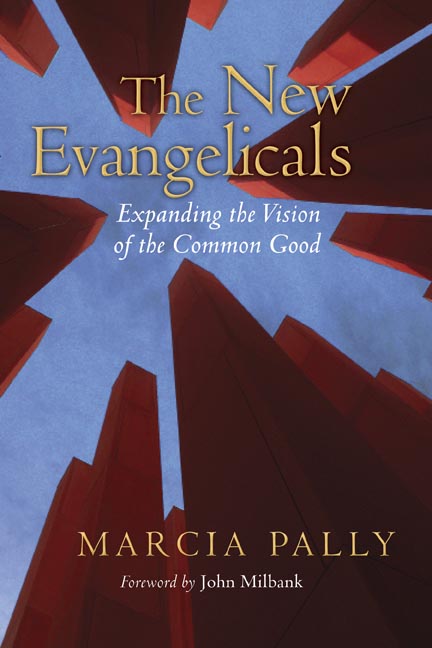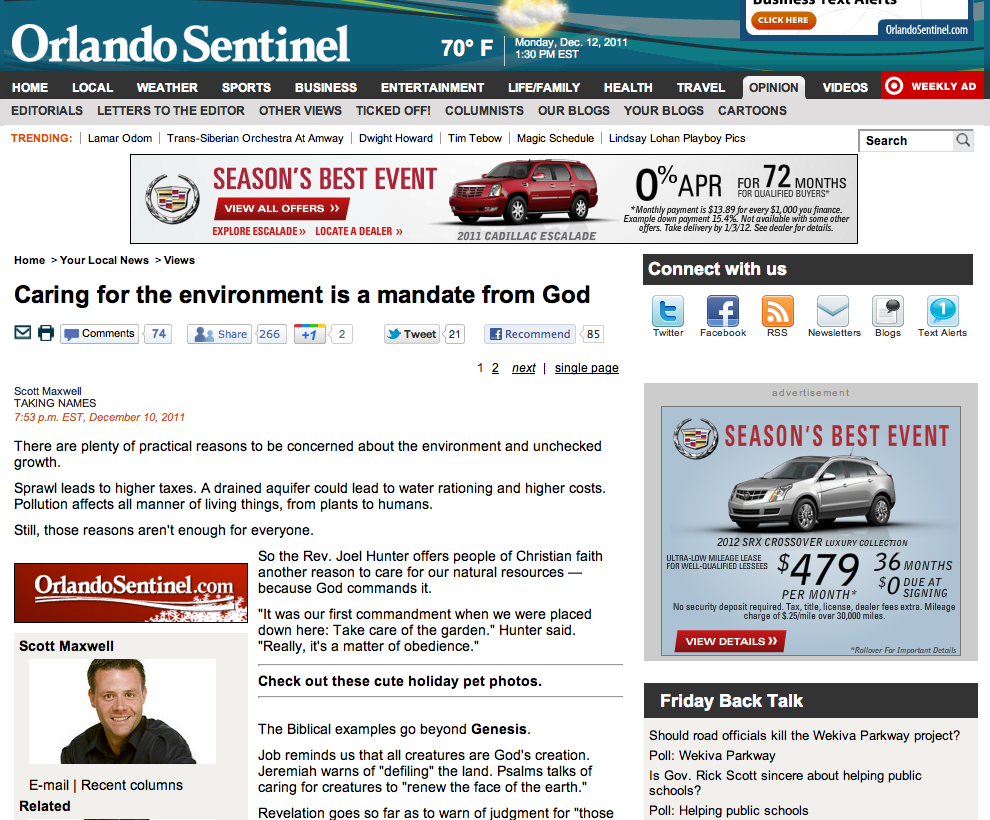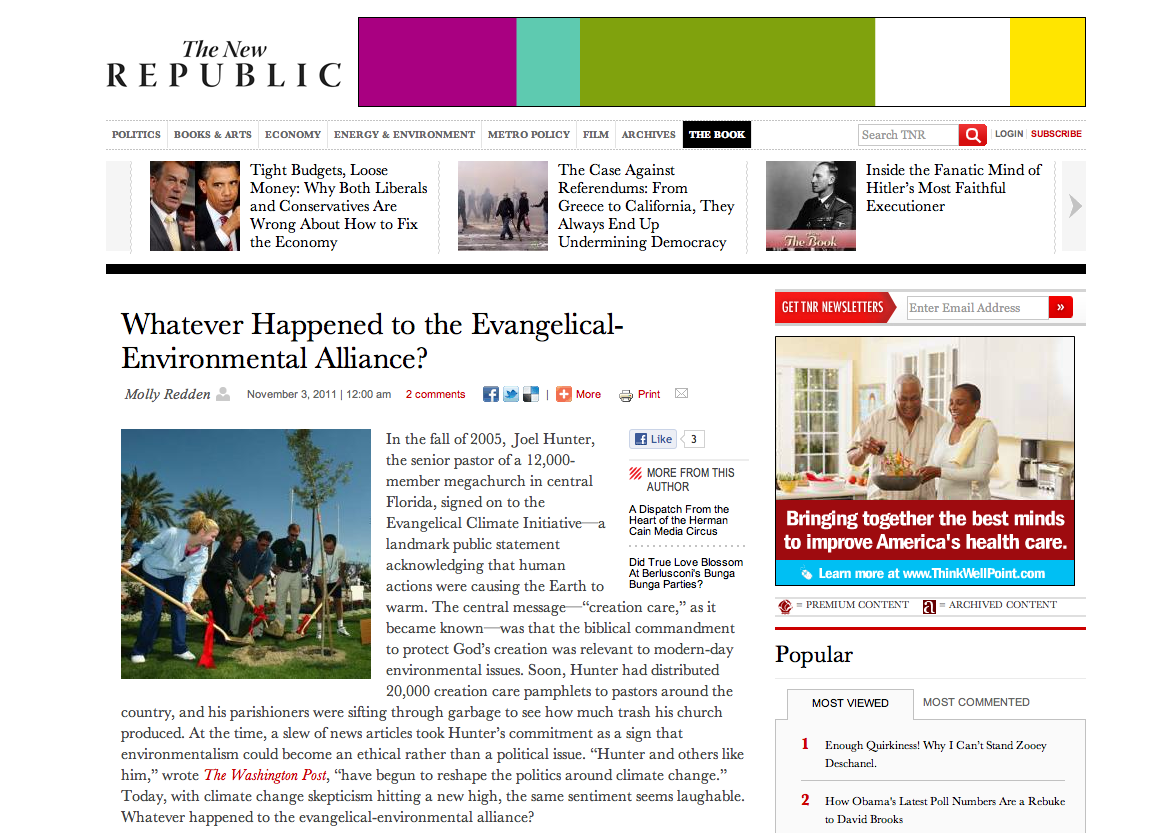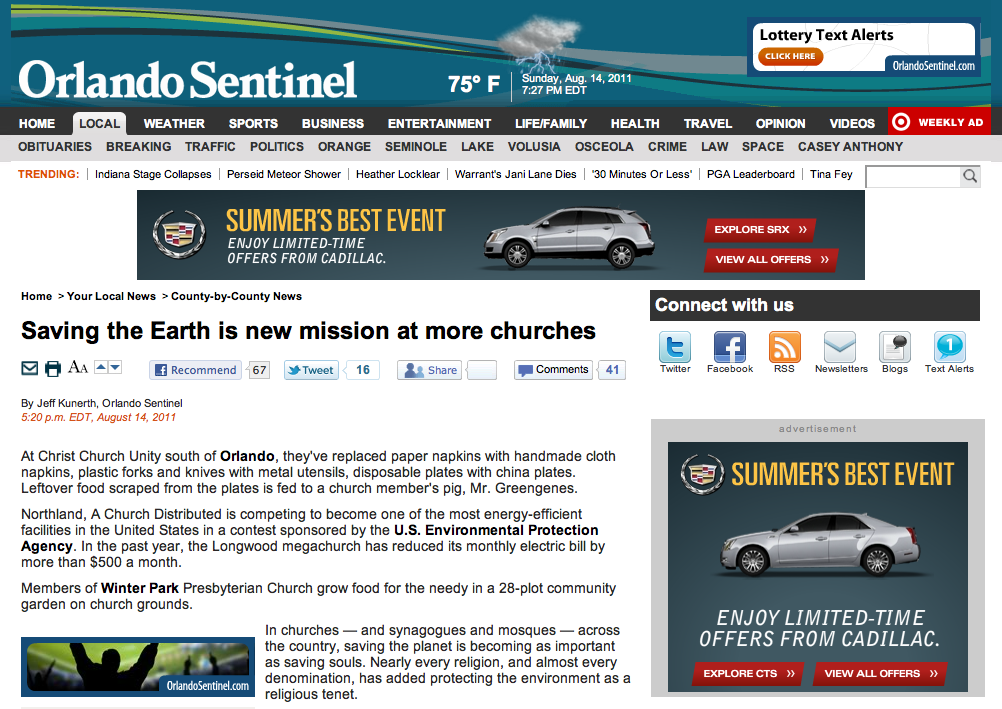Evangelicals and Climate Change: What Does the Future Hold? (Pt. 1)
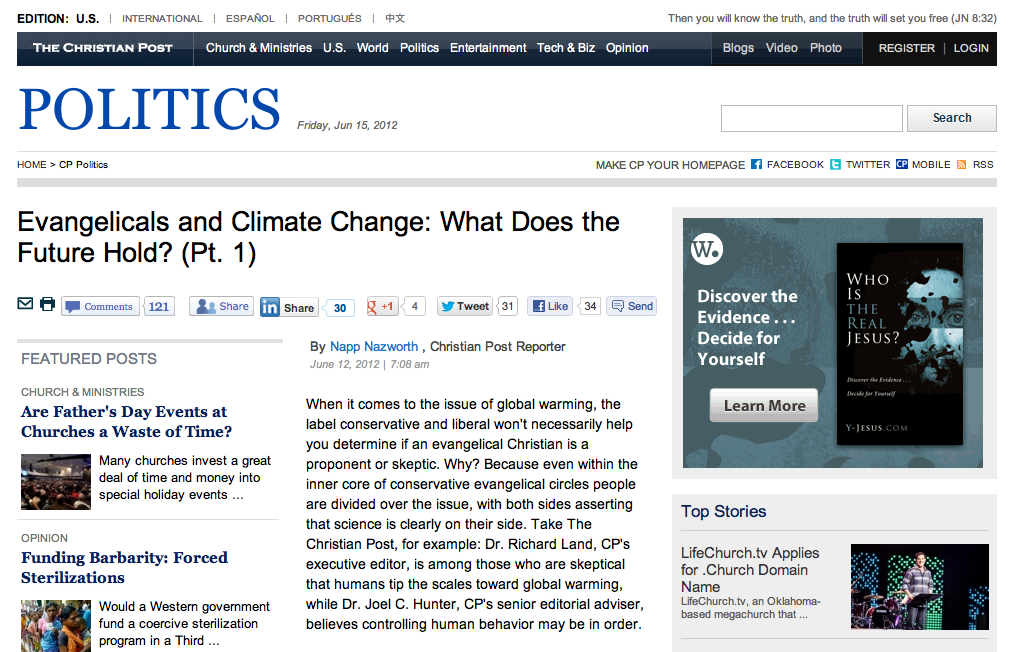 When it comes to the issue of global warming, the label conservative and liberal won't necessarily help you determine if an evangelical Christian is a proponent or skeptic. Why? Because even within the inner core of conservative evangelical circles people are divided over the issue, with both sides asserting that science is clearly on their side. Take The Christian Post, for example: Dr. Richard Land, CP's executive editor, is among those who are skeptical that humans tip the scales toward global warming, while Dr. Joel C. Hunter, CP's senior editorial adviser, believes controlling human behavior may be in order.
When it comes to the issue of global warming, the label conservative and liberal won't necessarily help you determine if an evangelical Christian is a proponent or skeptic. Why? Because even within the inner core of conservative evangelical circles people are divided over the issue, with both sides asserting that science is clearly on their side. Take The Christian Post, for example: Dr. Richard Land, CP's executive editor, is among those who are skeptical that humans tip the scales toward global warming, while Dr. Joel C. Hunter, CP's senior editorial adviser, believes controlling human behavior may be in order.
Moreover, the prospects for a global decision to control carbon because of warming have dropped precipitously over the last three years because of a worldwide economic downturn, much to the consternation of evangelical and secular activists alike. Skeptics are delighted. But activists also point to a recent article in The New Yorker, which reports that President Barack Obama will make climate change a priority if he gets elected to a second term.
So which side is correct? And how should Christians view the future of the global warming debate, both inside the Christian community and out?
The Christian Post will publish a multi-part series on evangelicals and climate change to look at both sides of the argument, and, more importantly, to look at the science underlying the debate.
Causes of Global Warming
Before one can properly understand the dynamics of the debate, a proper understanding of what science can and cannot determine is essential. When fossil fuels – coal, oil and natural gas – are burned, they release carbon (mostly in the form of carbon dioxide, but also as carbon monoxide) into the air. Carbon dioxide is an essential component of the atmosphere. Plants need it to grow. Humans and animals release carbon dioxide every time they exhale or pass gas. Plants use the carbon dioxide for photosynthesis and return oxygen to the atmosphere for animals to breathe.
With the burning of fossil fuels, however, humans are increasing the amount of carbon in the atmosphere. Changing the atmosphere in this way is causing the Earth to get warmer. The debate is over whether this additional carbon is actually affecting climate negatively enough to warrant regulating carbon emissions.
Molecules in the atmosphere, including carbon dioxide, trap some of the heat from the sun while the rest escapes back into space. If the amount of heat-trapping molecules is increased, then the Earth's natural "greenhouse effect" will increase, thus trapping more heat than usual. There are also some "multiplier effects" that further contribute to the greenhouse effect, such as additional water vapor in the air caused by warmer temperatures and less heat reflected into the atmosphere because there is less white (snow and ice) on the Earth's surface.
Cyclical Change to the Earth's Temperature
But there is debate over whether humans are taking the earth out of balance. The Earth's temperature has not been steady, even before industrialization. The 10th-14th centuries, for instance, are known as the "Medieval Warm Period." Temperatures in Europe were about one degree Celsius warmer than they are today. This led to greater harvests, which contributed to a flourishing of art, literature and science.
The Medieval Warm Period was followed by the "Little Ice Age" from about 1300 to 1870. Average temperatures during the coldest part of the Little Ice Age were about one degree Celsius colder than they are today. (For more information, see the website of Dr. Jan Oosthoek, an environmental historian at the University of Newcastle in England.)
Part of the debate over global warming has to do with whether the current warming period is mostly due to another warming period in Earth's natural warming/cooling cycles, or if the changes that humans have made to the Earth's atmosphere are pushing the planet beyond its ability to regulate itself. Those who believe the latter argue that the amount of warming taking place warrants considerable action to reduce the amount of carbon humans are putting into the atmosphere. For this series, this will be called the "global warming activist" position. Those who disagree will be called "global warming skeptics." Not because they are skeptical of global warming caused by atmospheric carbon, but because they are skeptical of the need for significant action to reduce atmospheric carbon. This will be discussed in more detail in part 3.
Global Warming Activists
A 2009 survey conducted by The Pew Forum on Religion & Public Life showed that white evangelical protestants were less likely than any other major religious group to say that the Earth is warming because of human activity (34 percent), followed closely by black protestants (39 percent). By comparison, 58 percent of the unaffiliated, 48 percent of white mainline protestants and 44 percent of white non-Hispanic Catholics said that the Earth is warming because of human activity.
Among evangelicals, there have been two main groups representing either side of this debate. The Evangelical Climate Initiative (ECI) represents global warming activists while Cornwall Alliance represents global warming skeptics.
The ECI issued a statement, "Climate Change: An Evangelical Call to Action," in 2006 expressing the view that global warming will have significant consequences warranting immediate action to greatly reduce the amount of carbon entering the atmosphere. It called for legislation that would limit carbon dioxide emissions.
"In the United States, the most important immediate step that can be taken at the federal level is to pass and implement national legislation requiring sufficient economy-wide reductions in carbon dioxide emissions through cost-effective, market based mechanisms such as a cap-and-trade program," the ECI statement reads.
Many evangelical leaders have signed the statement, including Leith Anderson, president of the National Association of Evangelicals (he was not with NAE at the time he signed) and senior pastor of Wooddale Church, Eden Prairie, Minn.; Rob Bell, former senior pastor of Mars Hill, Grandville, Mich.; Andy Crouch, editorial director of The Christian Vision Project for Christianity Today; David Gushee, professor of ethics, Mercer University, Atlanta, Ga.; Joel Hunter, senior pastor of Northland, A Church Distributed, Longwood, Fla. and a senior editorial adviser for The Christian Post; Brian McLaren, Emergent leader; Ron Sider, president of Evangelicals for Social Action; Jim Wallis, founder of Sojourners; and Rick Warren, senior pastor of Saddleback Church, Lake Forest, Calif.
Evangelical Environmental Network (EEN) also represents the global warming activist position. Founded in 1993, EEN publishes Creation Care magazine and speaks broadly on environmental issues. Its executive vice president, Jim Ball, has written a book on climate change called Global Warming and the Risen Lord: Christian Discipleship and Climate Change.
Some politically liberal evangelical organizations, such as Sojourners and Evangelicals for Social Action, can also be counted among the global warming activists.
Global Warming Skeptics
On the global-warming-skeptic side of the debate, The Cornwall Alliance began in 2005 as The Interfaith Stewardship Alliance. The name was changed in 2007 to reflect its founding document, The Cornwall Declaration on Environmental Stewardship. The Cornwall Declaration was first drafted by Dr. E. Calvin Beisner, the current spokesperson for the organization, in the fall of 1999 and was initially signed by 35 scholars who met in Cornwall, Conn.
Cornwall Alliance agrees that atmospheric carbon is warming the planet, but does not believe that the warming will be significant enough to warrant efforts to reduce carbon emissions. Further, it argues that those efforts would be harmful to the poor and vulnerable.
In 2010, Cornwall Alliance published its own statement, "An Evangelical Declaration on Global Warming," which was initially signed by over 450 evangelical scholars, pastors, theologians and ministry leaders. The signers include David Barton, president of Wallbuilders; Joel Belz, founder of World Magazine; Richard Land, president of the Ethics and Religious Liberty Commission and executive editor of The Christian Post; Tom Minnery, executive vice president of Focus on the Family; Tony Perkins, president of Family Research Council; and R. C. Sproul, Jr., president of Highlands Ministries.
Among evangelical denominations, the Southern Baptist Convention has passed resolutions on climate change that reflect a view similar to the Cornwall Alliance. The Southern Baptist Convention is the nation's largest evangelical denomination but is not a member of the National Association of Evangelicals.
Part two of this series will take a closer look at the activist position and discuss a debate among some of the activists on the best way to present their views. Part three will explain the skeptic's position.
FIND THIS ARTICLE AT: http://www.christianpost.com/news/evangelicals-and-climate-change-what-does-the-future-hold-pt-1-75935/
